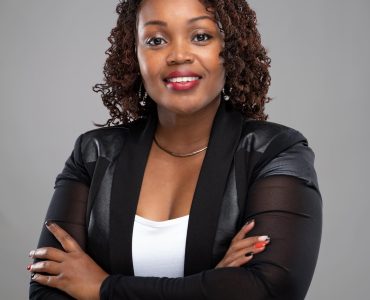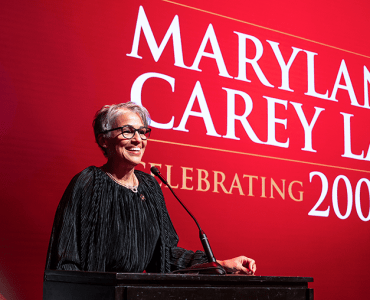Equity and Justice is a core values set at the University of Maryland, Baltimore (UMB). At each of UMB’s schools, equity, diversity, and inclusion (EDI) assistant/associate deans work to ensure that UMB embraces and is committed to diversity.
CATALYST caught up with the schools’ EDI officers to discuss their work: Eleanor Fleming, DDS, PhD, MPH, FICD, assistant dean for EDI, School of Dentistry; Shani Fleming, MSHS, MPS, PA-C, chief EDI officer, Graduate School; Russell McClain, JD, associate dean for diversity and inclusion, Francis King Carey School of Law; Sandra Quezada, MD, MS, AGAF, associate dean for faculty diversity and inclusion, School of Medicine; Chanel F. Whittaker, PharmD, BCGP, FASCP, assistant dean for equity, diversity, and inclusion, School of Pharmacy; and Neijma Celestine-Donnor, MSW, LCSW-C, assistant dean for DEI and director, Office of Diversity, Equity, and Inclusion, School of Social Work.
We discussed how they became involved in EDI work, what their school’s most pressing EDI issue has been, and what the future holds.
The School of Nursing announced in April that Yvette Conyers, DNP, MS, RN, FNP-C, CTN-B, CFCN, CFCS, will be joining the school on June 5 as its new associate dean for equity, diversity, and inclusion. We look forward to speaking to the new associate dean in a future issue of CATALYST magazine and promoting her work.
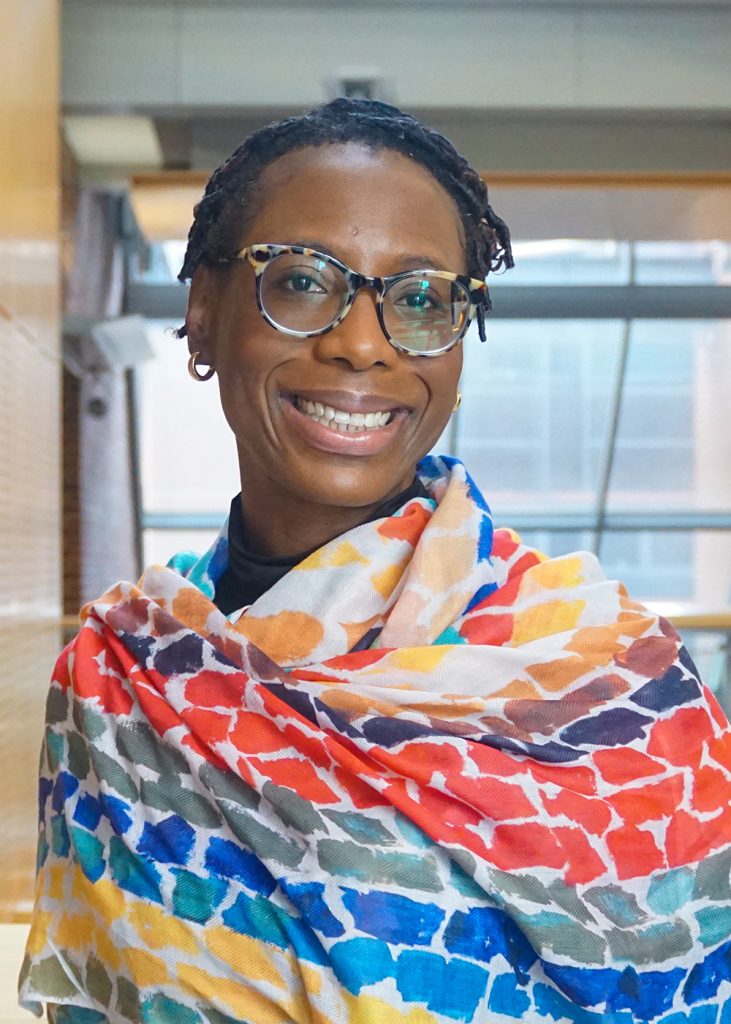
Eleanor Fleming, School of Dentistry
Why did you decide to go into the EDI field?
I am not sure that I decided to become an EDI practitioner or that this space of EDI found me. I became a dentist because of the death of Deamonte Driver, a child in Prince George’s County who died for want of a dentist. I knew that I wanted my practice of dentistry to center on what I now describe as “health justice.” I found my way formally to EDI in the wake of the global twin pandemics of racism and COVID-19. I decided to pursue a career in EDI at the University of Maryland School of Dentistry [UMSOD] because as the first dental school in the world, I figured that if any dental school would be a leader in this space, it would be here. Whether because of disparities in oral health outcomes for minoritized communities or an oral health workforce that is disproportionate to the population [Black, Hispanic/Latinx, American Indian/Alaska Native, and Native Hawaiians are 3.8 percent, 5.9 percent, 0.2 percent, and 0.2 percent of U.S. dentists, respectively], UMSOD is poised to make significant impacts and be a leader in EDI. I came here to help in that work.
“There is an intentionality to our work in the schools and across the University that makes what I do feel meaningful.”
Eleanor Fleming, DDS, PhD, MPH, FICD,
assistant dean for EDI, School of Dentistry
What has been the most gratifying change regarding EDI that you’ve been part of, either at UMB or elsewhere?
I remain encouraged seeing students who embrace EDI as a practice and as a reality of how things should be. Seeing students at UMB and at other institutions ask for anti-racism education, more diverse faculty and mentors, and expect leaders to be responsive to their needs as they relate to EDI tells me that we have a promising future. At UMB, I appreciate knowing that EDI work is resourced and funded. There is an intentionality to our work in the schools and across the University that makes what I do feel meaningful.
What has been the most pressing EDI issue facing your school over the past year? Have you been able to take steps to address it, and if so, how?
Rebuilding our sense of community and cultivating a spirit of belongingness that was challenged during the pandemic. While this challenge was not unique to UMSOD, it was nevertheless one that we had to address and respond to. The theme of the annual faculty and staff retreat in December 2022 was belongingness. We have EDI representatives as part of the predoctoral and hygiene classes to facilitate dialogue and action with students. Finally, we are supporting faculty members in creating learning spaces for students that includes mentoring. Making sure that the faculty, staff, students, and patients at UMSOD feel that they belong is our top priority, and with concerted efforts, we are rebuilding a stronger and more intentional community than perhaps existed prior to the twin pandemics. What we have accomplished, thus far, in addressing pressing EDI issues at UMSOD is a testament to the commitment of alumni, faculty, staff, and students as well as leadership from Dean Mark Reynolds, DDS, PhD, MA.
What are some of your goals for your school this coming year?
In this 2022-23 academic year, UMSOD has focused on building on its past successes in advancing equity, diversity, and inclusion. We embrace the diversity in our building from the students and residents who learn at the school to the hiring of faculty and staff as well as the invaluable contributions of alumni. UMSOD’S ultimate goal with regard to equity, diversity, and inclusion remains the same as it has been for years: to excel! We are committed to the training of students, advancing scientific research, supporting staff in their development, and ensuring that the care delivered in our clinics is patient-centered.
Specifically, UMSOD is focused on resourcing faculty, students, staff, and practicing oral health providers in the state on EDI. The school has an approved implicit bias continuing education course for dental providers, as part of the Maryland dental license renewal law. The Office of EDI is also providing trainings on inclusive teaching, facilitation, and other best practices for faculty. Elevating health equity in the school’s curricula and equipping the schools’ graduates to be health equity leaders is another top goal for this year. Course coordinators, clinical dental faculty, and department chairs support this work and have been champions for the value of EDI in student learning. The Office of EDI has provided lectures, and learning activities are being piloted to support student, faculty, and staff learning around health equity and social determinants of health. Finally, UMSOD continues to develop and strengthen partnerships with our West Baltimore neighbors and within dentistry. The Office of EDI actively participates with the Hispanic Dental Association, National Dental Association, and Society of American Indian Dentistry, for example. As UMSOD builds on past successes with recruiting and retaining diverse faculty, staff, and students, it seeks to strengthen the culture of belongingness and advance oral health equity in all of the places that members of our community practice clinically and conduct research for best practices.
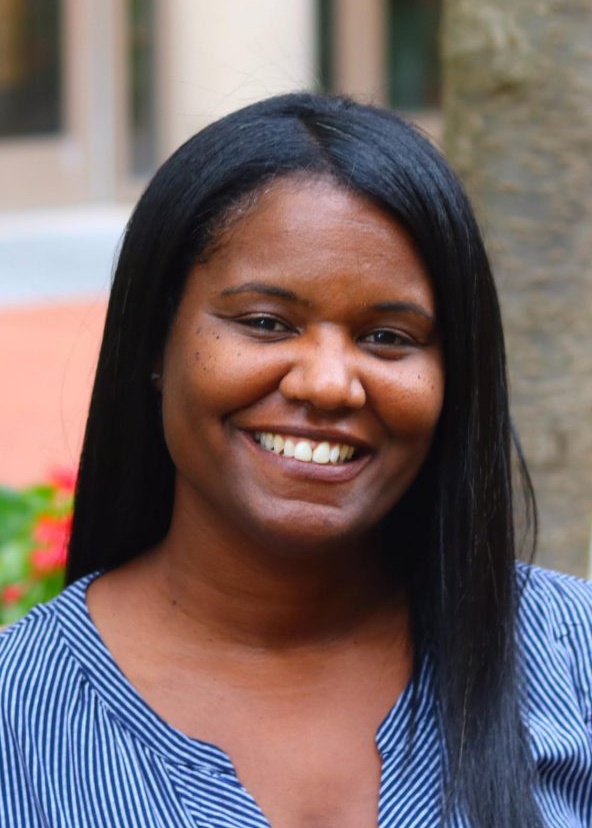
Shani Fleming, Graduate School
Why did you decide to go into the EDI field?
As a woman of color in predominantly white spaces, it provided a unique opportunity to witness and experience racial/ethnic bias, discrimination, and inequities. I was raised by parents and grandparents who served and broke barriers as people of color and encouraged me to do the same. When I decided to work in underserved communities, I observed the impact of the structural obstacles and social determinants of health. I made it my life’s mission to advocate for justice, equity, diversity, and inclusion [JEDI].
What has been the most gratifying change regarding EDI that you’ve been part of, either at UMB or elsewhere?
There have been many gratifying moments regarding EDI here at UMB. I recently had an opportunity to participate in a Faculty Development Institute in Costa Rica in early January 2023. It was a transformational experience and helped me to broaden my perspective regarding JEDI. Bringing the “Global is Local” lens, learning about similarities of experiences of folks thousands of miles away, and exploring many experiential learning and teaching tools centering on diversity was transformational.
What has been the most pressing EDI issue facing your school over the past year? Have you been able to take steps to address it, and if so, how?
Cultivating a sense of belonging. The COVID-19 pandemic shifted the entire culture of higher education, and the Graduate School did a great job pivoting. Creating a sense of belonging in hybrid spaces requires intentionality. The Graduate School holds monthly virtual all-call meetings in which all faculty and staff are encouraged to participate. We have a permanent agenda item addressing how folks with different social identities can thrive within the Graduate School. We also encourage “shoutouts” to praise co-workers for their efforts.
What are some of your goals for your school this coming year?
- Explore mechanisms for infusing EDI priorities in workload, performance evaluation plans, and AP [academic promotion] process
- Explore development and evaluation opportunities for promoting knowledge, resources, and shared understanding of JEDI excellence within all Graduate School curricula
- Provide ongoing JEDI educational opportunities to faculty, staff, and students promoting knowledge, resources, and shared understanding of JEDI excellence
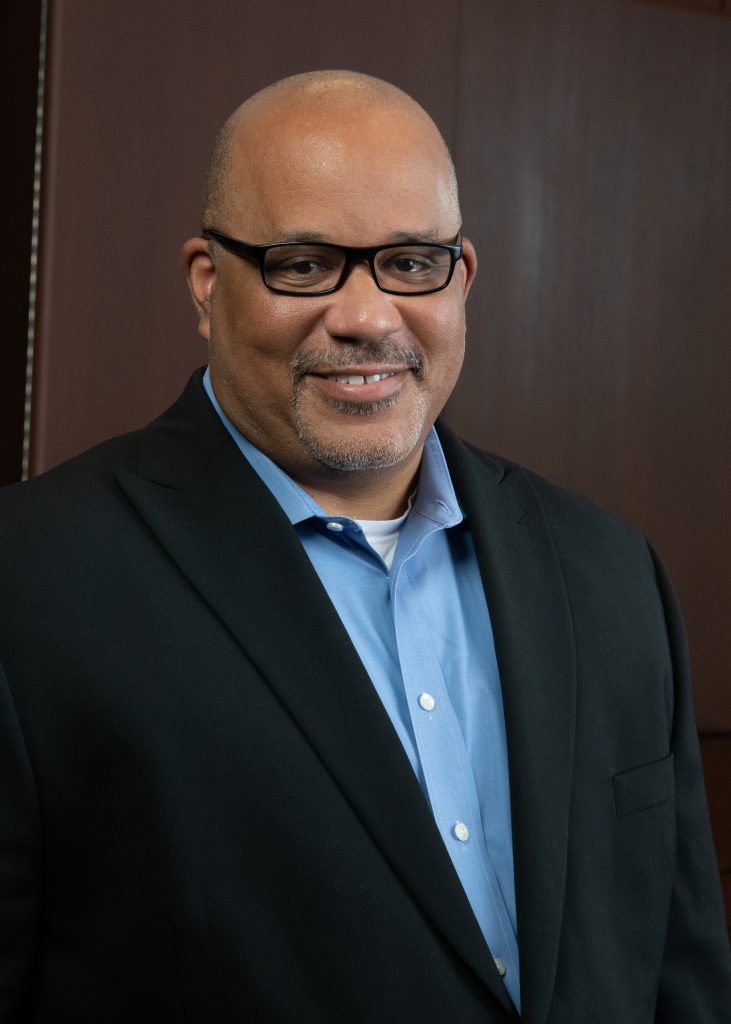
Russell McClain, Maryland Carey Law
Why did you decide to go into the EDI field?
I come by it honestly. Law school changed my life. Particular faculty made a huge difference in how I saw myself intellectually and academically. I have strived ever since to understand what made the difference and how I can help influence teaching and learning spaces that help students reach their full potential. This is especially true for those students who are from groups that have been historically underrepresented and marginalized in our profession.
“Maybe inclusion should feel ordinary, not extraordinary. It’s only a big deal when we start doing the things we should have been doing all along.”
Russell McClain, JD, associate dean for diversity and inclusion,
Francis King Carey School of Law
What has been the most gratifying change regarding EDI that you’ve been part of, either at UMB or elsewhere?
Every time I have an opportunity to make the law school environment better for students, it is extremely gratifying. I’ve been very fortunate to have these moments at our law school, on our campus, and at other institutions. There are many examples, but one that stands out almost seems silly in hindsight. It wasn’t that long ago that we didn’t have a nonbinary restroom on the classroom side of the law school building. As a practical matter, that meant that many nonbinary or transgender students had to travel to single-stall bathrooms that are very inconvenient to access between tightly spaced classes. At the time we made the decision to make this change, it seemed like such a big deal. The most rewarding thing I experience now is to see how NOT a big deal it is to have this restroom on the second floor. Maybe inclusion should feel ordinary, not extraordinary. It’s only a big deal when we start doing the things we should have been doing all along.
What has been the most pressing EDI issue facing your school over the past year? Have you been able to take steps to address it, and if so, how?
Others may disagree, but I think the most pressing issue facing legal education today is the structure of admissions policies and pathways. Black and Brown students, in particular, have fewer direct pathways to law school as a consequence of a variety of problems related to systemic racism. Soon enough, this problem is likely to become worse as a consequence of the anticipated Supreme Court declaration that race-based affirmative action policies will be unconstitutional. I am proud to say that the law school is working hard to see how we can be a leader in building the law school pipeline by working on development programs in partnership with HBCUs, HSIs, and other MSIs [Historically Black Colleges and Universities, Hispanic-Serving Institutes, and Minority-Serving Institutes].
What are some of your goals for your school this coming year?
As ever, find more ways to make our institution more inclusive and to build a sense of belonging for the members of our community who feel the most marginalized. I love this institution, but like everyone, we have blind spots. My goal every year is to discover more blind spots and to be thoughtful about how we might, as a community, better serve our staff, students, faculty, alums, and community.
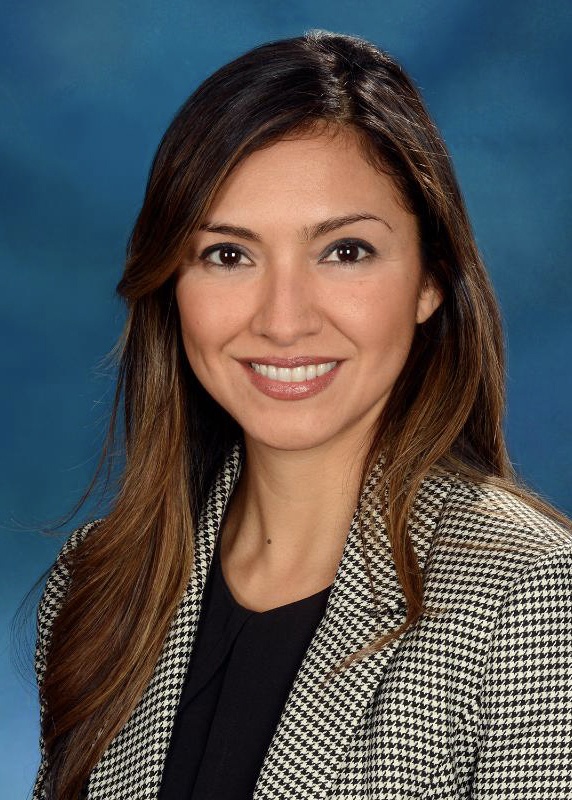
Sandra Quezada, School of Medicine
Why did you decide to go into the EDI field?
I was inspired to serve in a role that provided the opportunity to address injustice and help transform the institution into a place of learning in work that is even better than how I found it.
What has been the most gratifying change regarding EDI that you’ve been part of, either at UMB or elsewhere?
Without question, the two most gratifying changes I’ve been able to generate are in the areas of workforce diversity and dismantling the use of race-based medicine in clinical practice. In the area of workforce diversity, my proudest accomplishment has been implementing sweeping changes throughout the University of Maryland School of Medicine’s [UMSOM] applicant selection process, which has resulted in doubling the proportion of underrepresented students in each matriculating class since 2020 from about 12-13 percent to 26-30 percent.
I am equally proud of being the change agent that spearheaded a movement that ultimately resulted in a systemwide change where the University of Maryland Medical System discontinued the use of a race-based equation to calculate kidney function by glomerular filtration rate, or GFR. The race-based equation perpetuated a longer wait time for Black patients to become eligible for kidney transplant listing. This systemwide change opens the door for Black patients to receive earlier access to kidney transplant.
What has been the most pressing EDI issue facing your school over the past year? Have you been able to take steps to address it, and if so, how?
Our most pressing EDI issues at UMSOM center around faculty inclusion and engagement. We still need to increase faculty diversity; however, our need to better create community and dismantle systems of oppression for our existing diverse faculty is most pressing. We are working toward that goal with a two-step process that begins with first establishing a central office for EDI at UMSOM equipped with human and financial resources that increase capacity to then implement strategic interventions aimed at increasing engagement, opportunities for advancement, and support for our diverse faculty.
What are some of your goals for your school this coming year?
The development of a UMSOM Office for Justice, Equity, Diversity, and Inclusion consists of hiring a director for the office and leveraging the input from the UMSOM DEI Leadership Council to build a UMSOM DEI Strategic Plan. My goal is for all of these activities to be accomplished by the end of the 2023 calendar year.
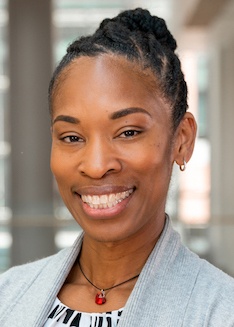
Chanel F. Whittaker, School of Pharmacy
Why did you decide to go into the EDI field?
Equity, diversity, and inclusion is important because offering high-quality health care to all is my primary responsibility as a pharmacist. As reflected in the oath of a pharmacist, I wholeheartedly commit to “promote inclusion, embrace diversity, and advocate for justice to advance health equity” as long as I continue to practice professionally and beyond.
Throughout my career as a pharmacist and academician, I have always integrated principles of equity and inclusion. Much of my work has been focused on influencing individual health outcomes and developing interventions to promote medication literacy in older adults. However, in this new role, I have the opportunity to make a much broader impact.
What has been the most gratifying change regarding EDI that you’ve been part of, either at UMB or elsewhere?
The School of Pharmacy is still in the early stages of our equity, diversity, and inclusive excellence journey, but we have begun to celebrate important milestones. One significant change since beginning our journey has been a shift in the dialogue around EDI from something that is relevant to a few interested stakeholders to a central guiding principle that is relevant to all that we do as a school.
One of the most gratifying changes is evident in recent changes to the Doctor of Pharmacy curriculum. In 2022, the faculty developed and approved new anti-racism and anti-oppression competency-based outcomes as part of the new PharmD curriculum.
“Equity, diversity, and inclusion is important because offering high-quality health care to all is my primary responsibility as a pharmacist.”
Chanel F. Whittaker, PharmD, BCGP, FASCP, assistant dean for equity, diversity, and inclusion, School of Pharmacy
Another exciting change that is currently in progress is that the school’s faculty affairs committee chaired by Amanda Oglesby, PhD, has been charged by the dean to integrate the school’s core values of “equity and justice” into the appointment, promotion, and tenure [APT] policies.
Integrating EDI into the APT process creates a new space for faculty to demonstrate excellence in research, teaching, practice, and service. But more importantly, this demonstrates the faculty’s commitment to the school’s mission to “globally engage and lead education, pharmacy practice, scientific research, and pharmapreneurial initiatives to collaboratively and equitably improve the health of society.”
What has been the most pressing EDI issue facing your school over the past year? Have you been able to take steps to address it, and if so, how?
The most pressing issue of the past year has been to remain in step with the rapid changes occurring nationally around equity, diversity, and inclusion. Our school’s journey is only a microcosm of the broader shift in research institutions, professional organizations, and the health care system to intentionally address pervasive and longstanding inequities. Therefore, while we celebrate the significant strides being made by the school related to integrating EDI into the PharmD curriculum and APT policies, I also see these as practical steps to prepare the school for changes in national policies related to program accreditation, practice, and research best practices. Beyond the need for change to remain accountable, we would like to embrace this time of change to evolve our school’s legacy of excellence to reimagine excellence through the lens of inclusion, a lens that seeks to advance equity, diversity, and inclusive excellence in teaching, service, and research.
What are some of your goals for your school this coming year?
In the coming year, there is one priority for the School of Pharmacy: to complete the “Beyond Excellent” strategic planning campaign. The school’s inaugural Equity, Diversity, and Inclusive Excellence [ED&I] strategic plan will establish the school’s unique brand of inclusive excellence. The “Beyond Excellent” campaign began in fall 2022 with multiple town halls and listening sessions with faculty, staff, and students to identify ED&I priorities for the school. The ED&I strategic plan centers on Theme 3 of the UMB strategic plan: University culture, engagement, and belonging. It has five key perspectives including accountability and sustainability; access and equity; inclusion and belonging; inclusive practice, research, and teaching; and community partnerships and pharmapreneurship. We look forward to publishing the full strategic plan in fall 2023.
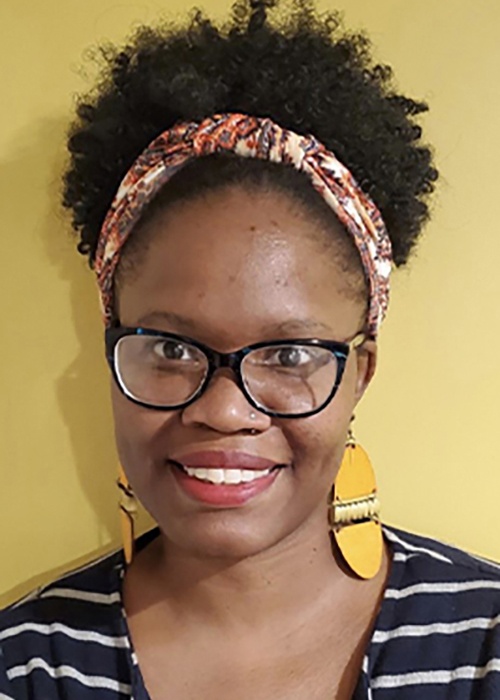
Neijma Celestine-Donnor, School of Social Work
Why did you decide to go into the EDI field?
As a social worker, I think those in our field our well positioned to do this work because it so much a part of this profession. I wanted to be a part of real and meaningful work and help our school to view equity and inclusion not as a box that needs to be checked but as a true priority.
What has been the most gratifying change regarding EDI that you’ve been part of, either at UMB or elsewhere?
Being part of the overall culture shift and change that has taken place at the University of Maryland School of Social Work [UMSSW]. Anyone who has been there in the last five years can feel and see it — all the units in our school through partnership with the DEI office that I lead have taken meaningfully and significant steps in areas such as climate/culture, curriculum, student engagement, and training to name a few. We have launched several initiatives and programs in this area like our affinity spaces, our mandatory structural oppression course for students, and our LEAD [Leading for Equity, Anti-racism, and Diversity] Training Institute.
What has been the most pressing EDI issue facing your school over the past year? Have you been able to take steps to address it, and if so, how?
Climate and culture. With the pandemic and even prior, we have been challenged with creating a more equitable and inclusive culture and increasing a sense of belonging. At UMSSW, we have a list of JEDI principles, and our focus over the last year has been the principle of community. We have taken steps to build community and increase a sense of belonging to improve our climate and culture for our faculty, staff, and students. These included continuing our affinity spaces, hosting community connect events, offering restorative practices training in community building circles, and showing recognition for our UMSSW community through the JEDI Awards. It’s a collective effort that involves everyone in the school. We also conduct a DEI pulse survey so we can have a “pulse” on how our community members are feeling about our climate and culture; we use the results from this to improve climate.
What are some of your goals for your school this coming year?
Three of our main priorities include expanding our work into the Baltimore City community, and we have been in discussions with our Community Engagement Center. We also have the goal of making our school more accessible and recently had an accessibility audit completed; under the leadership of our student affairs office, we will implement recommendations with a focus on disability justice rather than on disability compliance. Finally, we want to continue creating more equitable opportunities for our students. Our school leadership has been exploring ways to equalize tuition costs.
Last year, we launched a book lending program that provides free, easily accessible textbooks and other materials to students. Through this book lending program, we aimed to cultivate an environment of equity and inclusion by making textbooks more accessible for our students. We will continue to expand on this program and other ways our school can make a more equitable experience for our students.
Another goal we have is to be more intentional about how we support our faculty and staff. I want to be sure that my office is more intentional about providing support for our faculty in navigating DEI issues they may encounter in and out of the classrooms. And for our staff, continuing to work on increasing their sense of belonging.


